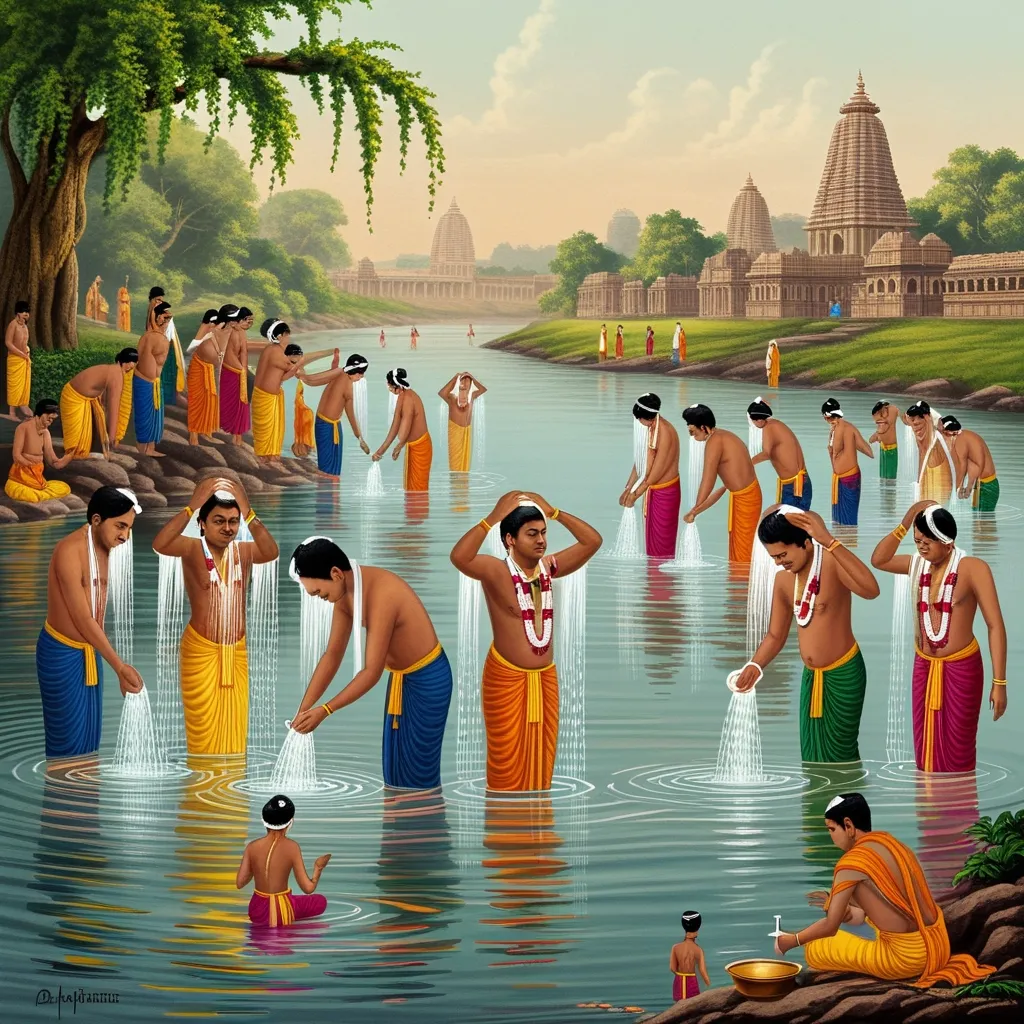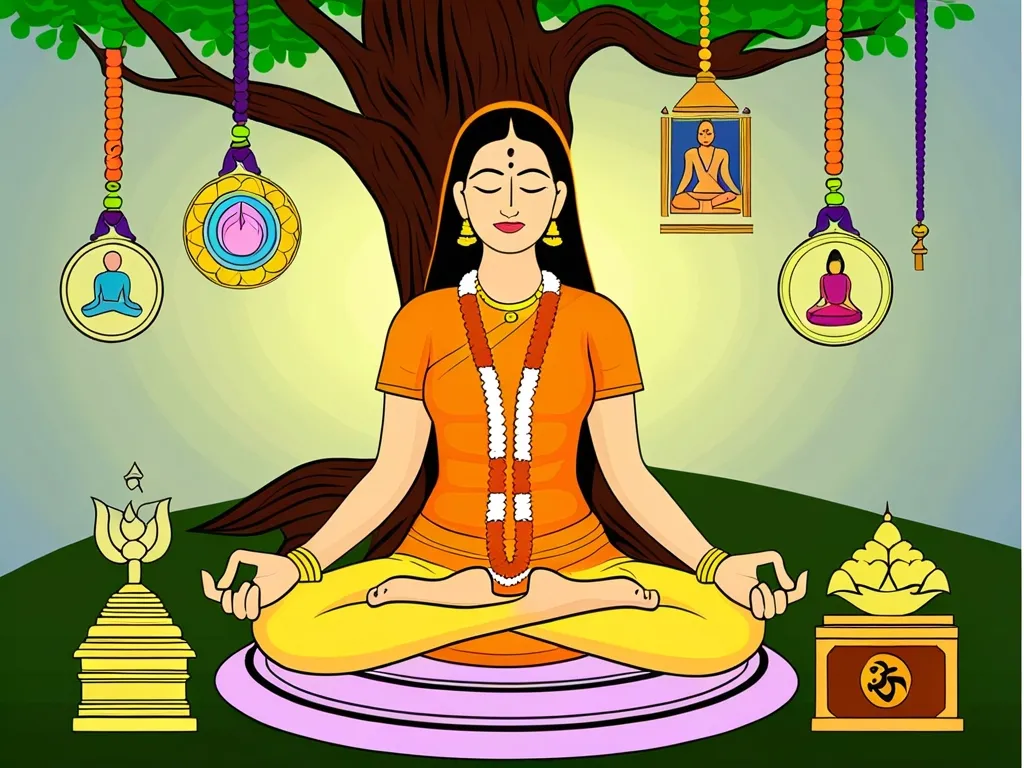Unveiling the Vedic Vision: A Blueprint for Harmony in Modern Society
The ancient Vedic texts, cornerstone of Hindu philosophy, offer a treasure trove of wisdom that’s surprisingly relevant in our fast-paced, modern world. These age-old scriptures paint a picture of harmony and balance that could be the antidote to many of our current societal ills.
At the core of Vedic thought is the idea that everything in the universe is connected. It’s like we’re all threads in this massive cosmic tapestry. The Bhagavadgita puts it beautifully, saying that the divine dwells equally in all creatures, playing no favorites. This concept of unity is pretty mind-blowing when you think about it.
The Vedas take this idea even further, suggesting that the entire cosmos is infused with a divine presence. It’s not just about trees and animals – it’s about everything, from the tiniest atom to the vastness of space. This perspective really makes you stop and think about how your actions ripple out and affect the world around you.
One of the coolest things about Vedic philosophy is how it views Nature. It’s not just about the great outdoors – it’s about everything, inside and out, personal and universal. This broad view encourages a deep respect for all life forms and the environment. It’s like seeing the world through a whole new lens.
Now, let’s talk about Dharma. It’s often mistranslated as “religion,” but it’s so much more than that. Think of it as a set of guiding principles that help us live in harmony with the natural order of things. It’s about recognizing the divinity in every person and treating them accordingly. Imagine how different our world would be if we all lived by these principles!
Another key concept in Vedic thought is Ahimsa, or non-violence. This isn’t just about not hitting people – it’s a whole way of life. It’s about cultivating an attitude of compassion and understanding towards all beings. Mahatma Gandhi took this idea and ran with it, showing the world how powerful non-violent resistance can be.
The Vedas also give us this mind-bending view of the cosmos that’s inspired scientists for generations. They talk about a unified field of consciousness where all the laws of nature come together. It’s like the ultimate theory of everything!
One of the most beautiful ideas in Vedic philosophy is “Vasudhaiva Kutumbakam” – the world is one family. In our increasingly divided world, this concept feels more important than ever. It’s a call to see beyond our differences and recognize our shared humanity.
The Vedas also offer a unique take on how to live a fulfilling life. They suggest a balance between renunciation and enjoyment. It’s not about giving up everything, but about enjoying life without being greedy or possessive. It’s a refreshing perspective in our often materialistic world.
In a time when corruption and greed seem to be everywhere, the ethical values promoted by the Vedas offer a much-needed moral compass. They remind us that true wealth comes from within and that our actions should benefit all of humanity, not just ourselves.
The Vedic approach to environmental harmony is particularly relevant today. It teaches that our relationship with Nature is a reflection of our inner state. If we’re at peace with ourselves, we’ll naturally treat the environment with respect. It’s not just about recycling or using eco-friendly products – it’s about a fundamental shift in how we see ourselves in relation to the world around us.
So, how can we apply these ancient teachings to our modern lives? It starts with cultivating a sense of awe and respect for the natural world. Try taking a moment each day to appreciate the beauty around you, whether it’s a sunset, a flower, or even the intricate design of a leaf.
Living in accordance with Dharma means striving to do the right thing, even when it’s difficult. It’s about being honest, kind, and considerate in our interactions with others. And embracing non-violence doesn’t just mean avoiding physical harm – it also means being mindful of our words and thoughts.
The Vedic concept of seeing the Self in all beings can transform how we interact with others. Next time you’re dealing with a difficult person, try to remember that they, too, are a manifestation of the divine. It might just change how you respond to them.
Recognizing the interconnectedness of all things can help us make more mindful choices in our daily lives. Every action we take has an impact, so we can ask ourselves: Is this choice contributing to harmony or discord in the world?
The balance between renunciation and enjoyment that the Vedas advocate for can help us navigate our relationship with material possessions. It’s okay to enjoy nice things, but we don’t need to be obsessed with acquiring more and more. True happiness comes from within, not from what we own.
Embracing the idea of “Vasudhaiva Kutumbakam” can broaden our perspective and increase our empathy. Try to see beyond national, racial, or cultural boundaries and recognize our shared humanity. Small acts of kindness towards strangers can help cultivate this sense of global family.
The Vedic approach to environmental harmony reminds us that true change starts from within. While external actions like recycling are important, real environmental stewardship comes from a place of deep respect and connection with Nature.
It’s important to remember that achieving harmony, according to Vedic wisdom, is not just about external changes but internal transformation. It’s about becoming more pure, spiritually strong, and educated. As we work on ourselves, we naturally contribute to a more harmonious world.
The Vedas offer us a vision of a world where all beings can find happiness, peace, and goodness. It’s a world where suffering is minimized because we all recognize our interconnectedness and act accordingly. While this might seem utopian, every small step we take towards this vision makes a difference.
In essence, the Vedic texts provide us with a roadmap to a more harmonious society. They remind us of our place in the grand cosmic scheme and encourage us to live in a way that benefits all. As we navigate the complexities of modern life, these ancient teachings can serve as a guiding light, leading us towards a more balanced, peaceful, and fulfilling existence.
By embracing these Vedic principles, we’re not just creating a better world – we’re also on a journey of self-discovery. We’re uncovering our true nature and our role in this vast, interconnected universe. And that, perhaps, is the greatest harmony of all.






